Confidentiality Statement
Confidentiality is an important aspect of the student-counselor relationship; therefore, counseling records are separate from JCSU records which prevent the counseling staff from discussing the student’s counseling in any capacity in the absence of authorized disclosure from the student.
In accordance with ethical guidelines, what you discuss with a mental health professional/counselor is kept confidential. Your written permission will be required to release information to other parties (i.e., professors, university staff, parents, spouse, other family members, or outside institutions). To maintain professional standards, your counselor may confidentially discuss specifics of your situation with other mental health professionals as part of a consultation to ensure that appropriate services are provided to you.
There are circumstances where information can be released without your consent or authorization. These include:
- If you are at risk of being a threat/danger to yourself, a mental health professional is permitted to release information necessary for the purpose of your safety and protection (i.e., contacting family members/emergency contact, administrators and/or seeking hospitalization).
- If an immediate threat of physical violence against an identifiable individual is disclosed, your counselor may take action (i.e., notifying the individual, police, administrator or seeking hospitalization, etc.).
- If abuse or harmful neglect of children, the elderly, or disabled/incompetent is known or reasonably suspected, your counselor must file a report with the appropriate state agency.
- In the event a client decides to bring a malpractice suit against the counselor/counseling center, the client’s record will be admitted as evidence in court.
- In court proceedings, a judge may require the mental health professional’s or counseling staff’s testimony and the client’s record if he/she/they determine this is necessary to resolve the issues before the court.
Understand that the laws concerning confidentiality can be complex. While your counselor is willing to discuss these matters with you, he/she/they are not an attorney. If you have specific legal questions, it is advised that you speak with an attorney/legal representative. Counseling staff are not permitted to provide you with legal counsel or legal counsel referrals.




